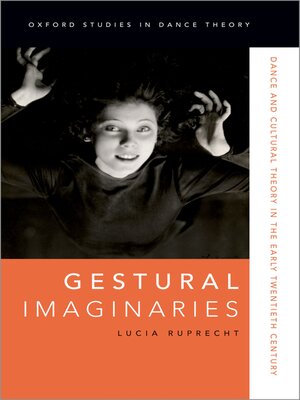Gestural Imaginaries
ebook ∣ Dance and Cultural Theory in the Early Twentieth Century · Oxford Studies in Dance Theory
By Lucia Ruprecht

Sign up to save your library
With an OverDrive account, you can save your favorite libraries for at-a-glance information about availability. Find out more about OverDrive accounts.
Find this title in Libby, the library reading app by OverDrive.



Search for a digital library with this title
Title found at these libraries:
| Library Name | Distance |
|---|---|
| Loading... |
Gestural Imaginaries: Dance and Cultural Theory in the Early Twentieth Century offers a new interpretation of European modernist dance by addressing it as guiding medium in a vibrant field of gestural culture that ranged across art and philosophy. Taking further Cornelius Castoriadis's concept of the social imaginary, it explores this imaginary's embodied forms. Close readings of dances, photographs, and literary texts are juxtaposed with discussions of gestural theory by thinkers including Walter Benjamin, Sigmund Freud, and Aby Warburg. Choreographic gesture is defined as a force of intermittency that creates a new theoretical status of dance. Author Lucia Ruprecht shows how this also bears on contemporary theory. She shifts emphasis from Giorgio Agamben's preoccupation with gestural mediality to Jacques Rancière's multiplicity of proliferating, singular gestures, arguing for their ethical and political relevance. Mobilizing dance history and movement analysis, Ruprecht highlights the critical impact of works by choreographers such as Vaslav Nijinsky, Jo Mihaly, and Alexander and Clotilde Sakharoff. She also offers choreographic readings of Franz Kafka and Alfred Döblin. Gestural Imaginaries proposes that modernist dance conducts a gestural revolution which enacts but also exceeds the insights of past and present cultural theory. It makes a case for archive-based, cross-medial, and critically informed dance studies, transnational German studies, and the theoretical potential of performance itself.







